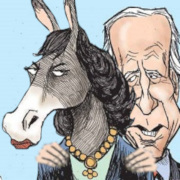|
KaiserBen posted:It has the potential to make the importation of surplus ammo much more difficult, as well as mandate tracking to the end-user (whether that's the dealer, eg: Century Arms, or the actual shooter, eg: Jimbo of Bumfuck NC, isn't quite clear). Article 5 is the major issue here; it's pretty unclear as to what exactly is meant by a "national control list", as well as what data would have to be in it and thus available to other countries or even if imports would have to be listed. Obviously, the NRA is taking the worst possible reading of it for their members, but that's pretty much to be expected. I don't see why tracking to the end user should be unduly objectionable to be quite honest- the whole point of this is to see what is being sold to whom over national lines. The "national control list" does sound a bit vague but with respect to imports and exports that's something I'd expect records to be kept of anyhow. As for importation of ammunition and weapons, I don't follow that sort of thing closely enough most of the time. It doesn't seem like it should affect a very large percentage of the shooting population in the United States given how many guns are around here already, but the bullets maybe not so much?
|
|
|
|

|
| # ? Apr 27, 2024 00:56 |
|
StandardVC10 posted:I don't see why tracking to the end user should be unduly objectionable to be quite honest- the whole point of this is to see what is being sold to whom over national lines. The "national control list" does sound a bit vague but with respect to imports and exports that's something I'd expect records to be kept of anyhow. Tracking to the end-user (if they mean the actual shooter) would be a PITA, since that covers a lot of people and generally you need that info at the time of import so a distributor couldn't buy a container-load of surplus and then sell it over the next few years as they do now. If they mean the distributor, that's done now (EUCs should have that info on them, at least for the importer). Also, that information has to be available to other governments, which people aren't too enthused by. This treaty also covers parts, not just guns and ammo. Tons of ammo is imported; and a fair number of firearms, including most of the collectible military stuff and a lot of lower end trap shotguns. Several popular cheaper brands of ammo are Russian, almost all the high-end rimfire is German, most surplus ammo is foreign now (there is plenty of US on the market, but no more being surplussed), etc. There are plenty of calibers where ammunition is simply not made in the US in any reasonable quantity (including some reasonably popular ones, like 5.45x39mm and 7.62x54R). After a quick survey of my collection, about 1/4 of it is US made. Another 1/4 or so has some US components and some foreign components (largely due to import law, some types of guns can't have all foreign parts). Almost all the ammunition I have is foreign made, even the US military calibers. The US already has rather silly laws preventing import of a lot of stuff, this is seen as another way to make it harder and more expensive without a whole lot of benefit (since we already largely follow the export restrictions), and giving up a fair bit of privacy as well. I can't say as I see the benefit in every world government knowing I bought a Nikon scope.
|
|
|
|
KaiserBen posted:Basically, if they'd explicitly allow "civilian sporting use" exemptions (or just clarify the reporting requirements), or the political situation wasn't so bad w.r.t. import laws, it'd pass and not even be in the news. It would never pass regardless of any exemption. Again, these are the same people who voted down the treaty on disabled rights where many of them were espousing paranoid tales of the UN potentially taking our guns. They're sure as hell never going to pass or be quiet about a UN treaty that actually involves guns.
|
|
|
|
I've been invited to attend a presentation on experimental economics at my university. The people who invite me to these sort of things are college libertarians who want me to attend because they want a debate. Otherwise it's just a boring presentation by the head of the university's economics department. I'm usually happy to oblige arguing against things like Sweatshops Are Good and Minimum Wage: Maximum Rage, because you can pick their arguments apart with basic logic and research, but I don't know anything about experimental economics. Here's a video I found: https://www.youtube.com/watch?v=HaFpB7z5y3Y There's all sorts of problems with that video, but I'd like to know what people here think about experimental economics.
|
|
|
|
Typical Pubbie posted:I've been invited to attend a presentation on experimental economics at my university. The people who invite me to these sort of things are college libertarians who want me to attend because they want a debate. Otherwise it's just a boring presentation by the head of the university's economics department. I'm usually happy to oblige arguing against things like Sweatshops Are Good and Minimum Wage: Maximum Rage, because you can pick their arguments apart with basic logic and research, but I don't know anything about experimental economics. Here's a video I found: So, Economics makes all sorts theoretical predictions about how people behave when solving particular problems, and those predictions are difficult to test in the real world because of all the confounding factors. Experimental economics is about creating lab experiments that duplicate those problems in a controlled environment (the lab) so as to (in theory) isolate how people actually act and use those results to evaluate the theory. It's a pretty cool discipline that is creating challenges to core assumptions central to economics, such as this paper. There are a bunch of really interesting results on the roles of fairness and reciprocity, bidding behavior in auctions, and other things. Google Scholar will do you right in finding many of them.
|
|
|
|
This is somewhat different from Typical Pubbie's question, but has there ever been an attempt to make a form of mathematical economics that use Marxist economic theory as its basis? Every single thing I've seen that tries to explain Capital/etc. has been in a word based, qualitative format and doesn't really use much of a quantitative backing, which would make it better suited for being used as a predictive or descriptive economic theory. I assume that a lot of the methods and measurements used in conventional economics would still hold, but it would be interesting to see what the differences are.
|
|
|
|
Spiderfist Island: There are plenty of numbers floating around in Marxian scholarship, though I'm not quite sure what you're after. If you're looking for something like DSGE or an agent-based modeling approach, then I haven't seen a whole lot; generally, Marxian and "conventional" economists start from very different points in their analysis, such that, e.g., you won't usually see many people working off the LTV messing around with utility functions or general equilibria or the like. That said, it's not like it never happens. Ian Wright, for example, has been pretty active in the use of modeling techniques with a heavy quantitative emphasis, even using agent-based models to make his point. More typically, though, Marxian analysis focuses on classes rather than individual actors. For what it's worth, I could see some of these techniques getting more play if, for instance, each of several agents represents a class in aggregate — but, again, I haven't seen much to that end. If you're more into accounting, you might consider looking into Bryer. Or, for a different sort of probabilistic avenue, Farjoun & Machover wrote a pretty famous book off the beaten track. If you're asking more generally about empirical work, then here is a (by no means exhaustive) list (plus one) that may point you in a useful direction. There are some examples here, too. Though, for my money, the most important recent empirical work in the Marxian tradition is Kliman's The Failure of Capitalist Production, which applies the theoretical interpretation laid out in his previous Reclaiming Marx's Capital to the U.S. national accounts from the great depression to the present. His findings seem to validate the "law of the tendency of the rate of profit to fall." Hope that's helpful. Aeolius fucked around with this message at 23:07 on Apr 17, 2013 |
|
|
|
Does anyone have any good articles for debunking the claim that voter fraud is a serious problem and that voter ID laws are necessary and good? Arguing with a guy on Facebook, and while I know I won't convince the guy himself, I know quite a few people who are on the fence on the subject read this particular Facebook page and I want to make the best possible impression on them by backing up everything I say with evidence. I'm looking for stuff myself but additional suggestions from the D&D hivemind would be greatly appreciated. e: VVVV Guess I should have read the thread first. Mister Bates fucked around with this message at 00:01 on Apr 19, 2013 |
|
|
|
Voter ID/fraud was broached by Kro-Bar on the bottom of page 40. The ensuing discussion should give you plenty of ammunition.
|
|
|
|
There's also an entire thread in archives(it was fairly recent, I'm surprised it's already there) covering this. It a bunch of links but I don't have them anymore. Somebody with archives should go mine that thread and add a post to this one. edit: Again I wish I had the links, but the think to remember is that actual cases of voter fraud are about 300 or so total for the past few decades, and many of them are things that ID laws wouldn't catch, like voting in multiple states. The main argument against voter ID laws is that it increases barriers to people for voting. No matter how easy you make it to get the ID's(and many laws don't make it easy), the group that doesn't have ID is always disproportionately minority, and even a small percentage of people having trouble is going to be a far larger number than the potential amount of fraud. Effectively suppressing the minority vote. Zeitgueist fucked around with this message at 00:21 on Apr 19, 2013 |
|
|
|
Are there any good reads on the economic and social make up and an in depth history of Germany under the Nazis? Basically covering things mentioned in the posts under my post in this thread: http://forums.somethingawful.com/showthread.php?threadid=3512233&pagenumber=147#post414849187
|
|
|
|
Richard Evans' Third Reich trilogy, in particular The Third Reich in Power, is pretty indispensable scholarship in that area.
|
|
|
|
Does anyone have any suggestions for discussing unions with people who bring the whole "they're a good idea in theory/were useful at one point but are just too strong" stuff to the table? I'm not talking diehard libertarians or conservatives, I mean mostly apolitical people or even otherwise liberal (though generally more on social things) who work lovely jobs. A few of my newer coworkers keep mentioning that unions are bad because the people at the top are corrupt or that the teacher's union puts emphases on the teachers instead of the students and is thus bad because our education system is behind enough as it is, and I'm really not sure how to approach it beyond linking articles that they won't read.
|
|
|
|
Good facts are that Germany is mostly unionized and still outperforms most countries, vying even with the US and China in terms of exports. Also that unions are literally what helped stop child labor, established the 8-hour work day/40 hour week, weekends, and workplaces that wouldn't literally kill or maim you. It's also part of what fueled the booming middle-class after WWII, because all those new employees demanded adequate pay (and then spent it on new stuff, which created more jobs with high wages, which...) If they say "Well yeah, but we don't need them now" just point out all the places that are trying to get child labor back on the table. It may be couched in terms like "kids on the family farm" but there are already exceptions for those, the proposed laws are for huge agribusiness farms that have already killed several teenagers. Without unions there's nothing stopping those laws from slowly eroding. Union power is already at the lowest point it's been since the depression, I'd guess. For the corruption issues, just point out that any large group of people with access to power tends to have corrupt people trying to abuse that power; just because you have things like the jerks with Enron or Arthur Anderson doesn't mean that all corporations must be destroyed, so examples of union corruption aren't evidence that unions should be eradicated. EDIT: I deliberately just said things off the top of my head rather than link a bunch of evidence, since that was what you described. Since they aren't going to be swayed by facts or proof, you have to go for the emotional aspect of argument for rhetorical effect. Unions keep people from dying, from your life being shittier than it already is, and just because a few are bad doesn't mean they're all bad. DarkHorse fucked around with this message at 03:55 on Apr 30, 2013 |
|
|
|
I've never been able to fully understand how debt applies to a nation, what effect having a deficit has on the economy and the standard of life of an average citizen, and the reasons behind why the average wage of a citizen would not increase provided the country was prosperous. Does anyone have recommendations for articles or books that would explain all this easily?
|
|
|
|
So, last I heard about Benghazi was "there was a military response, but blah blah blah, they ran into a safe room while under attack, caught fire, choked to death". The past day or so I've heard nothing but "kidnapped Benghazi survivors" and threatened informants/whistleblowers, etc. Can anyone provide some more specific non FOX sourced details? I think the last I saw was "anonymous tipster at FOX says" which is code word for "we made poo poo up".
|
|
|
|
Most of the resources in here are to help people debate, but I hope this little video can help people discuss: Jonathan Haidt: How common threats can make common (political) ground It's an assiduously balanced examination of how to look beyond your own ideological fetters to find some common ground with the people across the floor.
|
|
|
|
Countblanc posted:Does anyone have any suggestions for discussing unions with people who bring the whole "they're a good idea in theory/were useful at one point but are just too strong" stuff to the table? I'm not talking diehard libertarians or conservatives, I mean mostly apolitical people or even otherwise liberal (though generally more on social things) who work lovely jobs. A few of my newer coworkers keep mentioning that unions are bad because the people at the top are corrupt or that the teacher's union puts emphases on the teachers instead of the students and is thus bad because our education system is behind enough as it is, and I'm really not sure how to approach it beyond linking articles that they won't read. The only reason unions are too strong is due to a lack of regulation. This was done almost entirely to sabotage unions, corrupt them, and basically destroy their reputation. Simply because unions cannot operate effectively without supervision (name something that can) does not mean that they are no good.
|
|
|
|
Judakel posted:The only reason unions are too strong is due to a lack of regulation. This was done almost entirely to sabotage unions, corrupt them, and basically destroy their reputation. Simply because unions cannot operate effectively without supervision (name something that can) does not mean that they are no good. Not to play devil's advocate, but "NOT regulating it is all a big scheme to corrupt them!" isn't really that easy to defend without sources or at least writings of some kind to back it up. Not that I don't think you're right, it's just hard to defend the idea that inaction is being done deliberately without sounding like a conspiracy nut.
|
|
|
|
Parallel Paraplegic posted:Not to play devil's advocate, but "NOT regulating it is all a big scheme to corrupt them!" isn't really that easy to defend without sources or at least writings of some kind to back it up. Not that I don't think you're right, it's just hard to defend the idea that inaction is being done deliberately without sounding like a conspiracy nut. A problem people often face when dealing with these issues is that the individuals who support one action may not necessarily be cognizant of how it leads to this result. This really only means we're only one step removed from being able to say "this was clearly the intended result" though. Feel free to attribute ill will to them anyway.
|
|
|
|
Looking for some data. A few years ago I saw articles about an analysis showing that Americans with income between something like $20,000 to $500,000 had an average overall tax rate of 40-some odd percent, +/- 5% (so including sales tax and *everything* else). I can't find anything about it! Anyone see this too or know what's up? Are retracted papers liable to just *disappear?*
|
|
|
|
Judakel posted:The only reason unions are too strong is due to a lack of regulation. This was done almost entirely to sabotage unions, corrupt them, and basically destroy their reputation. Simply because unions cannot operate effectively without supervision (name something that can) does not mean that they are no good. Do you have any further reading on this
|
|
|
|
Judakel posted:The only reason unions are too strong is due to a lack of regulation. This was done almost entirely to sabotage unions, corrupt them, and basically destroy their reputation. Simply because unions cannot operate effectively without supervision (name something that can) does not mean that they are no good. Wait what? What the heck are you talking about, unions are basically dead in the US. The non-enforcement of protective labor law and the enforcement of restrictive labor law like Taft-Hartley and Right to Work have killed them. Are you making some kind of syndicalist argument that making them be accredited by the government under the NLRB corrupts them or something? icantfindaname fucked around with this message at 06:10 on May 3, 2013 |
|
|
|
icantfindaname posted:Wait what? What the heck are you talking about, unions are basically dead in the US. The non-enforcement of protective labor law and the enforcement of restrictive labor law like Taft-Hartley and Right to Work have killed them. Are you making some kind of syndicalist argument that making them be accredited by the government under the NLRB corrupts them or something? The exact opposite. I am just curious: How the hell did you read it in exactly the opposite way it was written and intended?
|
|
|
|
Judakel posted:The exact opposite. I am just curious: How the hell did you read it in exactly the opposite way it was written and intended? What do you mean by too strong? Also when you said regulation I assumed that meant anti-union regulation, though I see that probably was not the case. "Strong", let alone "too strong", is not a phrase I would use to describe modern American unions. icantfindaname fucked around with this message at 07:04 on May 3, 2013 |
|
|
|
icantfindaname posted:What do you mean by too strong? Also when you said regulation I assumed that meant anti-union regulation, though I see that probably was not the case. "Strong", let alone "too strong", is not a phrase I would use to describe modern American unions. When people criticize unions, they usually point to really corrupt ones that abuse whatever power they have to keep people from being fired that should've been fired and force employers to overlook negligence. The only reason unions can get so disproportionally powerful is due to a lack of proper oversight, yet the very people who gutted regulation are the ones criticizing this behavior.
|
|
|
|
Judakel posted:When people criticize unions, they usually point to really corrupt ones that abuse whatever power they have to keep people from being fired that should've been fired and force employers to overlook negligence. The only reason unions can get so disproportionally powerful is due to a lack of proper oversight, yet the very people who gutted regulation are the ones criticizing this behavior. The union security clause in Taft-Hartley, which is an ANTI-labor bill, is what causes this
|
|
|
|
Judakel posted:When people criticize unions, they usually point to really corrupt ones that abuse whatever power they have to keep people from being fired that should've been fired and force employers to overlook negligence. The only reason unions can get so disproportionally powerful is due to a lack of proper oversight, yet the very people who gutted regulation are the ones criticizing this behavior. There have never been any labor laws like that in the US though (or anywhere else AFAIK). You're acting like in the golden days there was some kind of magic law that 'fixed' unions and eliminated corruption but there wasn't. The more a union increases job security the more likely it is that someone lazy or an rear end in a top hat slips through the cracks, that's simply unavoidable. Corruption likewise is unavoidable, at least to some extent, in any organization with power, and as unions increase in power so does corruption. This stuff is inherent in labor unions. Now neither of these are serious problems nor have they ever been under, and the benefits of unions far outweigh them, but acting like anti-labor activists are the real reason for union corruption is just straight up wrong.
|
|
|
|
Alligator Horse posted:The union security clause in Taft-Hartley, which is an ANTI-labor bill, is what causes this Work on your reading comprehension. icantfindaname posted:There have never been any labor laws like that in the US though (or anywhere else AFAIK). You're acting like in the golden days there was some kind of magic law that 'fixed' unions and eliminated corruption but there wasn't. The more a union increases job security the more likely it is that someone lazy or an rear end in a top hat slips through the cracks, that's simply unavoidable. Corruption likewise is unavoidable, at least to some extent, in any organization with power, and as unions increase in power so does corruption. This stuff is inherent in labor unions. No one posited or implied that there was some magic law. However, with stealth deregulation (or cronyism, if you prefer) in the 1980s came increased corruption. Of course it is unavoidable for some corruption to take place, but it is unfair to attack this while simultaneously being of the ilk that would further defund the NLRB. They are serious problems and anti-labor activists are a huge part of the problem. Judakel fucked around with this message at 01:48 on May 4, 2013 |
|
|
|
Judakel posted:Work on your reading comprehension. Okay I think I finally understand. You mean that defunding the NLRB has led to non-prosecution of corruption, correct? That's pretty much right. You made it sound like there was a specific law set up to curb union corruption that was repealed.
|
|
|
|
icantfindaname posted:Okay I think I finally understand. You mean that defunding the NLRB has led to non-prosecution of corruption, correct? That's pretty much right. You made it sound like there was a specific law set up to curb union corruption that was repealed. I wasn't aware I had made it sound like that, but alright. Stealth deregulation is still deregulation.
|
|
|
|
You know what, i'd like to know about historical cases where you can say that the unions abused their power. Times where the economy of a country took a legit downfall directly because of unions. I'm not being sarcastic, i just want to be prepared for a possible argument someone might throw at my face.
|
|
|
|
Mans posted:You know what, i'd like to know about historical cases where you can say that the unions abused their power. Times where the economy of a country took a legit downfall directly because of unions. I'm not being sarcastic, i just want to be prepared for a possible argument someone might throw at my face. The Prisons.
|
|
|
|
You said:Judakel posted:When people criticize unions, they usually point to really corrupt ones that abuse whatever power they have to keep people from being fired that should've been fired and force employers to overlook negligence. Unions are legally obligated under Taft-Hartley to protect these employees. It is their responsibility to defend to the best of their ability any dues-paying member of the union, regardless of whatever lovely stuff they may be pulling at the workplace. This isn't a function of corrupt unions or indicative of an excess of union power due to a "lack of proper oversight." Your whole argument hinges on the idea that purposeful deregulation caused some kind of problem where unions become able to work the system to their advantage. You said: Judakel posted:The only reason unions can get so disproportionally powerful is due to a lack of proper oversight, yet the very people who gutted regulation are the ones criticizing this behavior. I think I'm comprehending you perfectly clearly. The thing is, the character of the hypocrisy you are citing is actually inverse from how it truly exists. The problem isn't deregulation and perverse incentives driving corruption, which is very clearly the narrative spun above, but the implementation of a legal framework which constrains the function and responsibilities of union organizations.
|
|
|
|
Mans posted:You know what, i'd like to know about historical cases where you can say that the unions abused their power. Times where the economy of a country took a legit downfall directly because of unions. I'm not being sarcastic, i just want to be prepared for a possible argument someone might throw at my face. Well the Teamsters were thoroughly influenced by organized crime for most of their history http://en.wikipedia.org/wiki/Teamsters#The_influence_of_organized_crime In terms of macroeconomic effects, rapid growth of unions can cause inflation. Interwar France had a left wing government that basically eliminated any and all laws that could be used to impede unions and invited them to go hog wild, which caused massive strikes and a nearly 50% increase in cost of living and wages in like 2 years. http://en.wikipedia.org/wiki/French_Third_Republic#The_Left_and_the_Popular_Front Both really really extreme cases, the Teamsters were corrupt as poo poo, and as for the economic stuff you basically have to have a preexisting, huge, militant labor movement and let it do whatever the gently caress, and even then it isn't catastrophic. icantfindaname fucked around with this message at 04:29 on May 4, 2013 |
|
|
|
Alligator Horse posted:You said: I don't think you understood anything I said. When someone is clearly negligent, the problem does not come from unions trying to protect that man's job. The problem comes from them succeeding in doing so. That is a function of corruption, not the proper leverage unions are supposed to achieve. Judakel fucked around with this message at 22:06 on May 4, 2013 |
|
|
|
Judakel posted:I don't think you understood anything I said. When someone is clearly negligent, the problem does not come from unions trying to protect that man's job. The problem comes from them succeeding in doing so. That is a function of corruption, not the proper leverage unions are supposed to achieve. Hey could you post further reading like I asked earlier
|
|
|
|
Enjoy posted:Hey could you post further reading like I asked earlier Go look up the history of stealth deregulation. If you're interested in the matter you certainly have the means to find the information yourself. Judakel fucked around with this message at 02:47 on May 5, 2013 |
|
|
|
Judakel posted:Go look up the history of stealth deregulation. If you're interested in the matter you certainly have the means to find the information yourself. This is the help each other debate thread, not the tell each other terms to absently google thread. Please post some reading or a more coherent explanation of what you're saying or both.
|
|
|
|

|
| # ? Apr 27, 2024 00:56 |
|
Judakel posted:Go look up the history of stealth deregulation. If you're interested in the matter you certainly have the means to find the information yourself. I googled "stealth deregulation of unions" that and got links to some bitchin' Yu-Gi-Oh sites, thanks!
|
|
|
























